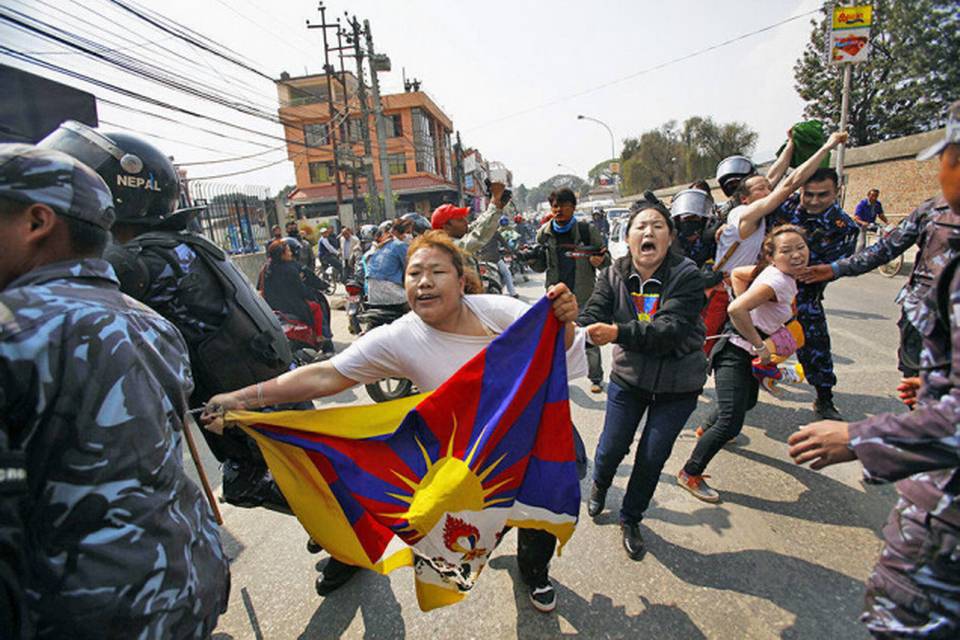WASHINGTON, D.C. : Congressmen James P. McGovern (D-MA) and Christopher H. Smith (R-NJ), Co-Chairs of the Tom Lantos Human Rights Commission, have released a letter to the Ambassador of Nepal urging the Nepali government to fully protect the human rights of Tibetans in Nepal.
The Co-Chairs were joined by six other Members of Congress including Chairman Eliot L. Engel and Ranking Member Michael T. McCaul of the House Foreign Affairs Committee, Chairman David Price and Co-Chair Vern Buchanan of the House Democracy Partnership, and Reps. Pramila Jayapal and Steve Chabot.
The letter expressed concern about the deportation back to the People’s Republic of China (PRC) of six Tibetans who crossed into Nepal from the PRC in September, in apparent violation of Nepal’s obligation of non-refoulment.
A crackdown on the Tibetan community around the time of the October visit to Nepal by PRC President Xi Jinping, the worrying prospect of an extradition treaty between Nepal and the PRC, the increasingly stringent restrictions on freedom of assembly and expression suffered by Tibetans in Nepal, and the essentially stateless status of many members of the Tibetan community were also raised.
The Members of Congress urged Nepal to halt deportations of Tibetans, refrain from the use of preventive detention and register all Tibetan refugees living in Nepal. These steps would ensure that Tibetans’ human rights would be fully protected in keeping with Nepal’s international obligations and its moral imperatives as a multiethnic, multifaith society.
Here is the full text of the letter:
H.E. Dr. Arjun Kumar Karki
Ambassador of the Federal Democratic Republic of Nepal
The Embassy of Nepal
2730 34th Place NW
Washington DC 20007
Your Excellency,
We write as Members of the United States Congress to encourage your government to fully protect the human rights of Tibetans under Nepalese jurisdiction.
We have seen reports that on September 5, 2019, Nepalese authorities deported six Tibetans who had crossed into Nepal from the People’s Republic of China (PRC) seeking asylum. According to witness accounts, when the Tibetans arrived on foot at Legme on September 5, Nepalese border police arrested and handcuffed the refugees, took them to Simikto, in Humla district, Karnali Pradesh, and turned them over to Chinese border police on the same evening.
This was done even though Nepal is bound by customary international law to not return people to a place where they may face persecution, which is clearly the case for Tibetans in China.
These actions appear to be a violation of the long-standing “Gentlemen’s Agreement” between Nepal and the UN Refugee Agency (UNHCR) intended to protect Tibetan refugees in transit. Nepal’s adherence to its obligations in this regard remains a priority interest for Congress, as it was in 2003 when a trade bill regarding the Nepalese garment industry was withdrawn in the Senate after Nepal returned 18 Tibetan refugees to China.
In mid-October media reports indicated that prior to PRC President Xi Jinping’s visit to Nepal, Nepalese police cracked down on the Tibetan community in Nepal, closing monasteries and preemptively detaining a number of Tibetans. According to witnesses, police went to the homes of Tibetans to apprehend them.
They also locked down the Jawalakhel Tibetan refugee settlement and closely monitored Tibetan homes for the elderly. Nepal also reportedly prevented more than 30 Tibetans who reside in Nepal from returning from travel to Dharamsala, India, until after President Xi had departed.
We had welcomed reports prior to President Xi’s visit that a proposed extradition treaty between Nepal and the PRC would not be signed. We believe that was a correct decision given the well-documented lack of independence of the Chinese judicial system and its failure to guarantee due process.
So we are disappointed and concerned that the Joint Statement between China and Nepal issued during President Xi’s trip “expressed hope for an early conclusion of the Treaty on Extradition.” Extradition treaties can be a legitimate tool for international law enforcement, but should not be used to send people to a country where they would be at risk of serious human rights abuses.
Recognizing the PRC’s long-standing repression of Tibetans within its borders, we fear that an extradition treaty would be used by that government to persecute Tibetans living in Nepal. Additionally, we encourage the government of Nepal to remain alert to the risk that such an agreement would provide the PRC a means to coerce Nepal into taking certain actions compromising Nepal’s freedom of action with respect to certain policy decisions.
Mr. Ambassador, these recent news items have deepened our long-standing concern for Tibetans in Nepal, who are now living under increasingly stringent restrictions on freedom of assembly and expression and are often denied the documentation needed to attend school, seek employment, run businesses, or travel abroad. Nepal’s stated determination not to allow any “anti-China activities on its soil” cannot justify restrictions on fundamental civil and political rights.
Nor is it tenable that many Tibetans who fled to Nepal after 1989 are essentially stateless, whereas those Tibetans who arrived between 1959 and 1989 were recognized and registered as refugees by your government. However, since 1989 that has not been the case – a situation that increases Tibetans’ vulnerability to mistreatment.
We are heartened that the United States and Nepal share a bond as multiethnic, multifaith societies. Nepal’s efforts to protect the rights of minority communities are in keeping with this identity and in Nepal’s national interest.
We urge your government to halt deportations of Tibetans, to refrain from the use of preventive detention and to register all Tibetan refugees living in Nepal. These steps would ensure that Tibetans’ human rights, including the right to claim asylum, are fully and vigorously protected in keeping with Nepal’s obligations under international law as well as its moral and humanitarian imperatives.
We appreciate your consideration.
Sincerely,
Members of Congress









Comment